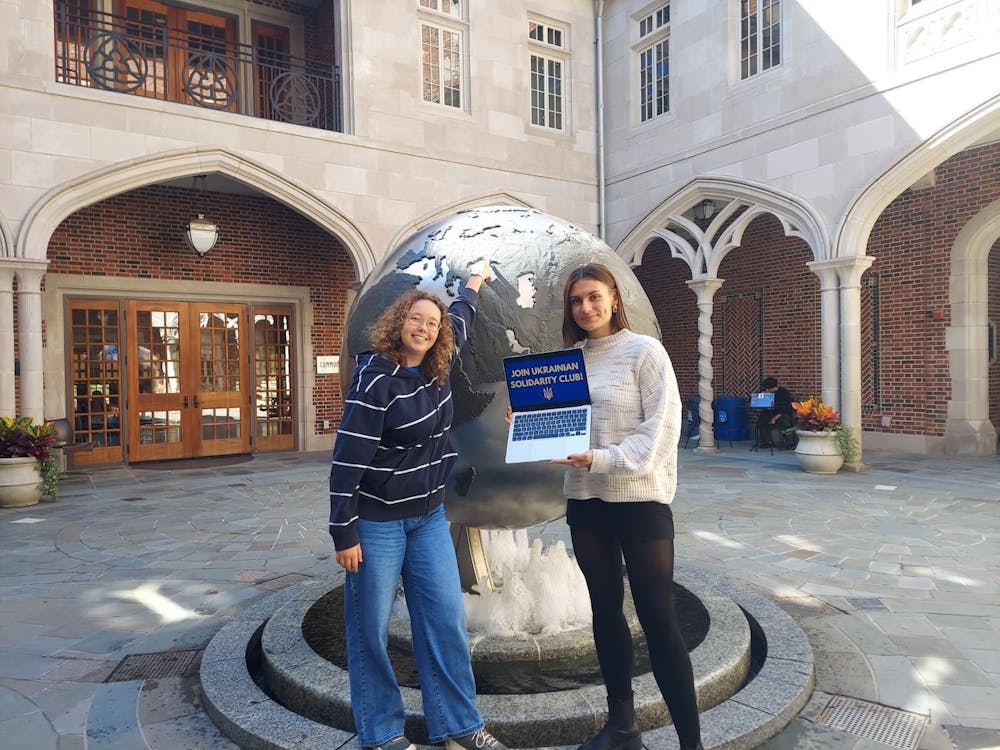Thousands of miles from home, two University of Richmond students are dedicated to spreading awareness about the war in Ukraine on campus.
Olena Naumenko, a sophomore from Ukraine, and Natalia Jung, a sophomore from Poland, founded the Ukraïnian Solidarity Club in February 2025, ahead of the third anniversary of the invasion by Russia. The club’s first gathering included a showing of the documentary “20 Days in Mariupol,” followed by a question-and-answer session hosted by Ukrainian students and faculty members from the Russian Studies department.
“Last semester, there was some misunderstanding that it was a space only for Ukrainians, and it was pretty much the opposite,” Naumenko said. “We decided to answer the questions of non-Ukrainians about the war, about the invasion and about the country itself, because we were not really known before Russia invaded us.”
Making Ukrainian culture known was one of the main goals Naumenko and Jung had when founding the club.
“It’s not just all politics and depressing stuff,” Jung said. “We’re trying to create a community and share culture. It’s really important for us to just have people be interested and share time with us. If we, at a university, are not able to do this, how are we going to do it on a societal level?”
Jung and Naumenko said there is a disconnect between how Americans view the invasion of Ukraine and how Europeans view the invasion. They said they have encountered Americans who did not know that the war was still ongoing in Europe.
“I just don’t think that it is a life-and-death feeling for Americans. It is more of a political issue,” Jung said. She said in Poland, a neighboring nation to Ukraine, the fear of invasion forces people to be aware. “There have been press conferences where Putin would question the legitimacy of the Polish border, but this would affect us. It wouldn’t affect the U.S.”
Naumenko and Jung both acknowledge their luck in being able to attend a university in the U.S.. They said they have a duty to use their positions to advocate for their friends and family back home.
“We are four or five people representing the entire generation who are unable to talk for themselves because they don’t have the privilege to be here,” Naumenko said. She said that she has doubts about whether she is the best person to speak up for Ukrainians, but she said that she still feels obligated to speak out for the people at home who cannot.
Some Americans may be hesitant to ask Ukrainian students about the war for fear of being insensitive or triggering, Naumenko said. While she appreciates the concern, she encourages any questions about her experience or the experiences of other Ukrainians.
One of the purposes of the club is to hold space for conversations around the news coming out of Ukraine. Sometimes, Naumenko said, the news coming into the U.S. is so delayed that the best place to talk about it is within the club.
As leaders of the Ukraïnian Solidarity Club, Naumenko and Jung are continually planning events to help bring together students who are part of the community, want to get involved in advocacy or simply want to stay educated and learn about another culture. They said that ways for the greater Richmond community to get involved include contacting their representatives in support of policies to help Ukraine.
Enjoy what you're reading?
Signup for our newsletter
“It is on the person to find those opportunities,” said Michael Warchol, the Ukraïnian Solidarity Club’s faculty advisor and the university’s director of communications for the arts. “A lot of it is not easily seen or reported, so you have to be looking. If a student is connected with the club, they’ll probably understand more of those opportunities.”
For UR students who want to start small, Naumenko and Jung started publishing monthly newsletters in September of 2025 sharing updates from Ukraine. Their newsletters can be found on the Ukraïnian Solidarity Club’s website, where interested students can also learn about upcoming club events to attend.
“At some level, even if it’s a college campus, seeing people engaged and asking questions and supporting you matters a lot,” Naumenko said.
Beyond getting students involved, Jung said she hopes the club can touch people’s hearts.
“When you meet people from an area, you hear stories that turn numbers into faces. There is the chance that people will carry that with them, maybe to the dinner table with their family, and spread knowledge and love for the culture and the language,” Jung said. “It’s not just politics, it’s people.”
Contact features writer Amelia Beard at amelia.beard@richmond.edu
Support independent student media
You can make a tax-deductible donation by clicking the button below, which takes you to our secure PayPal account. The page is set up to receive contributions in whatever amount you designate. We look forward to using the money we raise to further our mission of providing honest and accurate information to students, faculty, staff, alumni and others in the general public.
Donate Now



